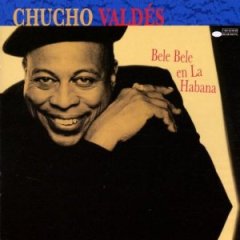Chucho Valdés - Bele bele en La Habana (1998)
Chucho Valdés - Bele bele en La Habana (1998)

1.-Son Montuno (un son de Chucho),
2.-Lorraine (una balada chá, también de Chucho y dedicada
a Lorraine Gordon, la dueña del jazz club Village Vanguard de Nueva York), play
3.-But Not For Me (un mambojazz de George Gershwin), play
4.-Con Poco Coco (una descarga del legendario pianista Ramón "Bebo" Valdés, padre de Chucho),
5.-El Cumbanchero (una guaracha del puertorriqueño Rafael Hernández),
6.-Tres Lindas Cubanas (un danzón de Guillermo Castilo),
7.-La Sitiera (una guajira de Rafael López)
8.-Los Camínos (un guaguancó de Pablo Milanés).
Personnel:
Jesus "Chucho" Valdes (piano);
Alain Perez (vocals, acoustic bass);
Raul Pineda Roque (drums);
Roberto Vizcaino Guillot (percussion).
Chucho Valdés (ur. 9 października 1941 w Quivicán, Kuba) - kubański pianista, bandleader, kompozytor i aranżer. Jest synem słynnego Bebo Valdésa, także pianisty, szefa muzycznego słynnego hawańskiego klubu Tropicana. Chucho rozpoczął naukę gry na fortepianie w wieku trzech lat. W wieku 16 lat kierował już własnym zespołem. W 1967 znalazł się w Orquestra Cubana de Música Moderna, a w 1973 założył Irakere. Obok pracy w dużych zespołach praktykował także grę w małych zespołach typu combo i grę solową. Nagrał 31 płyt, spośród których 5 zdobyło nagrodę Grammy.
BELE BELE EN LA HABANA was nominated for a 1999 Grammy for Best Latin Jazz Performance.
His two decades of success as leader, main composer, and arranger of the supercharged Cuban jazz fusion group Irakere have often obscured the talents of Jesus "Chucho" Valdés as a pianist. Now Valdés seems ready, indeed eager, to take his playing center stage. Bele Bele en la Habana, recorded in Toronto early in 1998, features Valdés with a stripped-down quartet playing a program of originals and Cuban standards. It's an impressive show. With sure technique, Valdés seamlessly blends elements of jazz (postbop phrasing and rich harmonies reminiscent of Bill Evans), classical, and Afro-Cuban music. He offers high energy and lyricism ("Son Montuno"), an implacable groove ("Con Poco Coco," "La Sitiera," "But Not for Me"), and even a dash of melodrama now and then (the classic "Tres Lindas Cubanas"). Irakere might have lost their leader, but jazz has gained a superior pianist. --Fernando Gonzalez
Hurricane Chucho, a much-revered maestro in Havana, president of the Havana Jazz Festival and the embodiment of modern Cuban jazz piano, is better represented by this date than he has ever been. The music fairly leaps from your speakers, piano and rhythms grabbing you forcefully by the sensibilities and compelling you towards a journey that is equal parts dazzling and delightful. –Jazz Times
Issued just after his landmark two-week June 1998 gig at the Village Vanguard and subsequent U.S./Canada tour, Chucho Valdés' first album for Blue Note bears out a lot of the hype surrounding this hugely gifted Cuban pianist. Unlike many of today's younger Cuban keyboard hotshots, Valdés not only has great technical chops and musical erudition, he manages to stay closely tied to his Cuban rhythmic roots. Thus, he employs a Cuban percussionist Roberto Vizcaino Guillot along with the standard bass (Alain Pérez Rodriguez) and drums (Raúl Píńeda Roque), which dramatically increases the possibilities for rhythmic experiments. Valdés more often than not is all over the keyboard, comfortable with everything from Ravel-ian classical complexity to Bill Evans' introspection to Cecil Taylor-like crunches. But there are surprisingly few wasted motions; all of the notes fit. He creates tremendous excitement on "Con Poco Loco" (which ends with a sly steal from "Giant Steps"), and suddenly breaks into a cornucopia of European stream-of-consciousness fireworks before returning to Cuba on "Son Montuno." However, the best moments on Bele Bele en La Habana come when Valdés hooks his fire-eating technique into the groove and doesn't let go. "El Cumbanchero" contains some sudden rhythmic shifts that will have you leaping out of your chair, and "Tres Lindas Cubanas" gradually builds a great head of steam. This CD will give you a much better idea of Valdés' pianistic capabilities than any of his records with Irakere. On a political level, it is interesting and disheartening to note that Valdés recorded this album in Toronto under the auspices of EMI Music Canada; a direct signing with Blue Note would have exposed the American company to charges of trading with the enemy. Obviously, as of 1998, the Cold War was not completely over. ~ Richard S. Ginell
download: uploaded yandex 4shared mediafire solidfiles mega zalivalka cloudmailru filecloudio anonfiles oboom
Last Updated (Tuesday, 19 August 2014 13:48)








